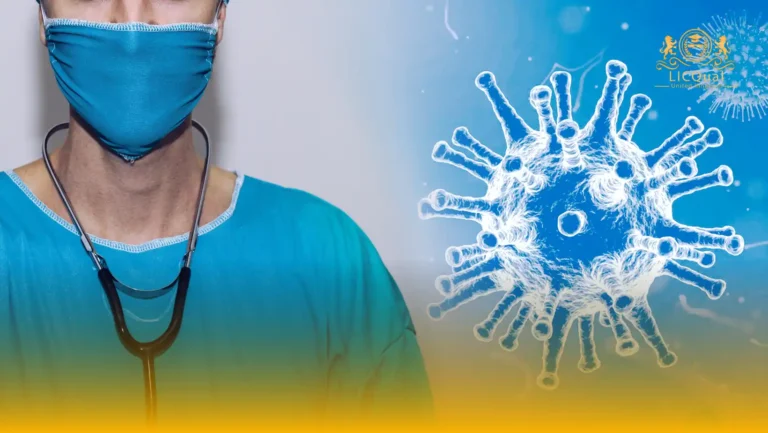The LICQual Level 3 Diploma in Food Safety and Nutrition (Dip Food Safety) is a comprehensive qualification designed for learners who wish to develop advanced knowledge in food safety, hygiene, and nutritional management. This diploma equips learners with the essential skills to assess, implement, and maintain safe food practices while understanding the critical role of nutrition in promoting health and wellbeing. Learners gain expertise in food handling, hazard analysis, risk management, and nutritional evaluation, ensuring they are well-prepared to operate in professional food-related environments.
This qualification is aimed at professionals who want to enhance their career prospects, expand their knowledge, and strengthen their Continuing Professional Development (CPD). It is particularly suitable for food industry professionals, catering managers, health and nutrition practitioners, food safety officers, and anyone involved in food preparation, quality assurance, or nutritional advisory roles. Learners will develop the ability to ensure compliance with food safety legislation, implement hygiene best practices, and integrate nutritional principles into food planning and service.
Centres delivering this qualification are required to maintain the highest standards of teaching and learning. They must provide learners with competent and qualified staff, access to up-to-date learning materials, practical tools, and resources, and a supportive environment that facilitates effective study and assessment. This ensures learners gain both theoretical knowledge and practical competence, preparing them for professional success in food safety and nutrition.
With a strong focus on applied science, regulatory compliance, and professional development, the Level 3 Diploma in Food Safety and Nutrition equips learners with the knowledge and skills needed to make a meaningful impact on food safety standards and public health while advancing their careers in the food and nutrition sectors.
Course Overview
Qualification Title
LICQual Level 3 Diploma in Food Safety and Nutrition (Dip Food Safety)
Total Units
6
Total Credits
60
GLH
240
Qualification #
LICQ2201061
Qualification Specification
To enroll in the LICQual Level 3 Diploma in Food Safety and Nutrition (Dip Food Safety), applicants must meet the following criteria:
|
Qualification# |
Unit Title |
Credits |
GLH |
|---|---|---|---|
|
LICQ2201061-1 |
Principles of Food Safety and Hygiene |
10 |
40 |
|
LICQ2201061-2 |
Food Contamination and Hazard Analysis |
10 |
40 |
|
LICQ2201061-3 |
Nutritional Science and Dietary Principles |
10 |
40 |
|
LICQ2201061-4 |
Food Preparation, Storage, and Handling |
10 |
40 |
|
LICQ2201061-5 |
Public Health and Food Safety Management |
10 |
40 |
|
LICQ2201061-6 |
Professional Practice and Continuing Development in Food Safety and Nutrition |
10 |
40 |
By the end of this course, learners will be able to:
Unit 1: Principles of Food Safety and Hygiene
By the end of this unit, the learner will be able to:
- Explain the importance of food safety and hygiene in protecting public health
- Identify key legislation, regulations, and guidelines governing food safety practices
- Describe safe food handling, storage, and preparation procedures
- Apply food safety principles in professional food environments
Unit 2: Food Contamination and Hazard Analysis
By the end of this unit, the learner will be able to:
- Identify different types of food hazards: biological, chemical, and physical
- Analyse sources and causes of food contamination
- Apply risk assessment and hazard control methods, including HACCP principles
- Develop strategies to prevent contamination and ensure safe food production
Unit 3: Nutritional Science and Dietary Principles
By the end of this unit, the learner will be able to:
- Explain the role of macronutrients and micronutrients in health and wellbeing
- Analyse dietary requirements for different populations and age groups
- Evaluate the relationship between nutrition, lifestyle, and disease prevention
- Apply nutritional knowledge to plan balanced and safe meals
Unit 4: Food Preparation, Storage, and Handling
By the end of this unit, the learner will be able to:
- Demonstrate safe food preparation techniques to prevent contamination
- Explain proper storage and preservation methods to maintain food quality and nutritional value
- Evaluate handling procedures to reduce risk in commercial and domestic settings
- Apply best practices in food service to ensure safety and compliance
Unit 5: Public Health and Food Safety Management
By the end of this unit, the learner will be able to:
- Analyse the impact of food safety on public health outcomes
- Evaluate food safety management systems and quality assurance processes
- Apply HACCP and other control measures in professional food environments
- Develop strategies for maintaining compliance with food safety legislation and standards
Unit 6: Professional Practice and Continuing Development in Food Safety and Nutrition
By the end of this unit, the learner will be able to:
- Demonstrate ethical and professional conduct in food safety and nutrition practice
- Apply reflective practice to improve personal competence and professional performance
- Develop a personal Continuing Professional Development (CPD) plan
- Communicate effectively with colleagues, clients, and stakeholders in professional contexts
The LICQual Level 3 Diploma in Food Safety and Nutrition is designed for anyone who wants to build expertise in food safety, hygiene, and nutrition. Whether you are working in the food industry, healthcare, or wellness sector, this course equips you with practical skills and knowledge to enhance career prospects and promote safe, healthy eating practices.
Food Industry Professionals
- Gain in-depth knowledge of food hygiene and safety regulations
- Learn to manage and prevent contamination risks in food production
- Understand nutritional requirements for different populations
- Apply practical strategies for maintaining safe food environments
- Enhance professional credibility with an internationally recognized qualification
- Strengthen skills for leadership and compliance in food-related roles
Healthcare Practitioners
- Develop expertise in nutrition for patient care
- Learn to implement safe food handling practices in healthcare settings
- Support patients with diet planning and nutrition advice
- Understand the link between nutrition and overall health outcomes
- Gain confidence in assessing dietary needs and safety standards
- Expand career opportunities in healthcare and wellness services
Catering and Hospitality Workers
- Learn essential food safety protocols for kitchens and service environments
- Understand nutrition for menu planning and healthy meal preparation
- Implement hygiene standards to reduce risks in food handling
- Gain skills to comply with local and international food safety laws
- Improve customer satisfaction through safe and nutritious food service
- Enhance employability in restaurants, hotels, and catering companies
Students and Career Starters
- Gain a recognized Level 3 qualification to boost employability
- Build foundational knowledge in food safety and nutrition
- Learn practical skills applicable to healthcare, hospitality, or wellness sectors
- Prepare for further studies in nutrition, dietetics, or food safety
- Develop confidence in food handling and nutrition planning
- Increase opportunities in professional and industrial roles
Wellness and Nutrition Enthusiasts
- Understand safe nutrition practices for personal and professional use
- Learn to create balanced and healthy meal plans
- Gain insight into food safety standards for home and community settings
- Apply practical strategies to promote health and wellbeing
- Learn evidence-based nutrition interventions for different age groups
- Improve knowledge for coaching, consultancy, or lifestyle programs
Caregivers and Support Workers
- Ensure safe food practices for vulnerable populations
- Understand nutritional needs of children, older adults, and patients
- Learn practical meal planning for health support
- Promote healthy eating habits and prevent food-related risks
- Develop skills for effective communication with healthcare professionals
- Gain confidence in maintaining safe and nutritious food environments
Entrepreneurs in Food and Wellness
- Learn food safety protocols for starting a business in food or nutrition
- Understand nutrition principles for product development
- Apply hygiene and safety standards in commercial operations
- Gain credibility to attract clients and customers
- Learn strategies for safe food storage, handling, and preparation
- Strengthen knowledge for running nutrition-focused businesses successfully
Centres delivering the LICQual Level 3 Diploma in Food Safety and Nutrition must meet the following standards to ensure high-quality training, assessment, and learner success:
- Qualified and Competent Staff
Trainers, assessors, and internal quality assurers must be appropriately qualified, experienced, and competent in food safety, nutrition, and professional training delivery. - Access to Learning Resources
Centres must provide learners with up-to-date textbooks, research journals, digital platforms, and practical resources to support effective teaching, learning, and independent study. - Robust Assessment and Quality Assurance Systems
Centres should implement clear procedures for assessment, internal moderation, and quality assurance to maintain fairness, consistency, and compliance with awarding body standards. - Suitable Facilities and Learning Environment
Centres must provide a safe, supportive, and well-equipped environment for classroom-based, blended, or online delivery, ensuring learner engagement and high-quality outcomes. - Learner Support Services
Centres must offer guidance, academic support, and access to professional development resources to enable learners to achieve their qualification goals. - Commitment to CPD
Teaching and support staff should actively engage in Continuing Professional Development (CPD) to maintain expertise and deliver high-quality training experiences. - Technology and Digital Access
For online or blended learning, centres must ensure learners have reliable access to e-learning platforms, digital resources, and technical support.
By meeting these requirements, centres can deliver the Level 3 Diploma in Food Safety and Nutrition to the highest standards, ensuring learners gain both theoretical knowledge and practical competence.
Assessment and Verification
All units within this qualification are subject to internal assessment by the approved centre and external verification by LICQual. The qualification follows a criterion-referenced assessment approach, ensuring that learners meet all specified learning outcomes.
To achieve a ‘Pass’ in any unit, learners must provide valid, sufficient, and authentic evidence demonstrating their attainment of all learning outcomes and compliance with the prescribed assessment criteria. The Assessor is responsible for evaluating the evidence and determining whether the learner has successfully met the required standards.
Assessors must maintain a clear and comprehensive audit trail, documenting the basis for their assessment decisions to ensure transparency, consistency, and compliance with quality assurance requirements.







